【BBC六分钟英语】我们害怕食物吗?
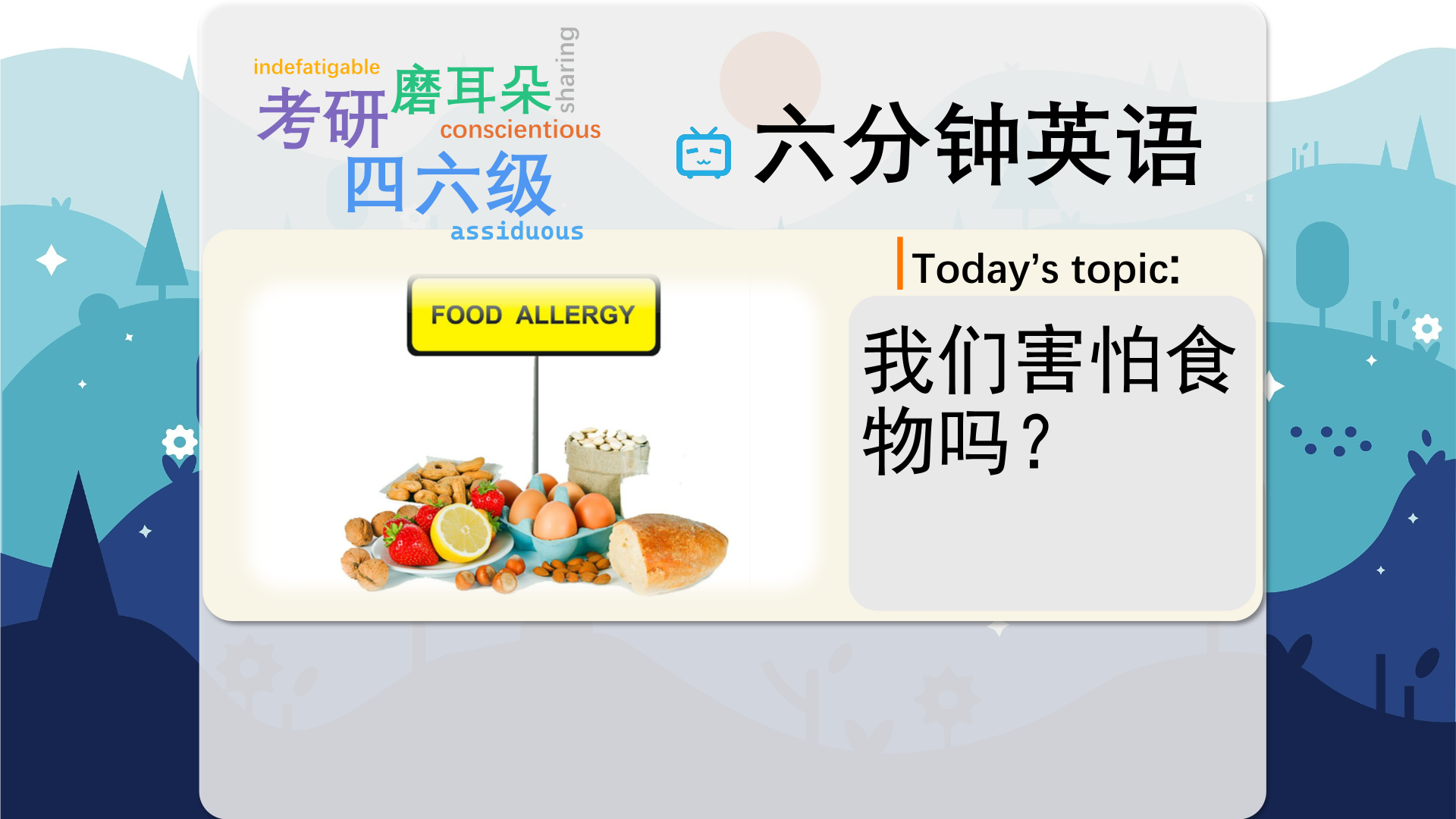
【英文脚本】
Neil
Hello and welcome to 6 Minute English. I’m Neil…
Alice
… and I’m Alice. Neil, what are you eating?
Neil
Peanuts.
Alice
Hmm. Did you know that one of the producers, here, has an allergy to peanuts?
Neil
No, I didn’t, but they’re not in the studio with us, so it doesn’t matter, does it?
Alice
It only takes a tiny piece of peanut to cause a big allergic reaction in some people. An allergy by the way, is a condition that makes you feel ill after eating, touching or breathing in a particular substance.
Neil
And food allergies are the subject of today’s show.
Alice
Alright, put your peanuts down, Neil and answer today’s quiz question. What substance is used to treat a severe allergic reaction? Is it… a) penicillin? b) adrenalin? Or c) aspirin?
Neil
OK, well, I’m going to go for a) penicillin.
Alice
Well, we’ll find out if that’s the right answer later on. Now let’s listen to Dr Marianne Williams talking about why being too clean may not be a good thing. She is a dietician here in the UK.
Dr Marianne Williams, gastroenterology dietician, UK
For roughly the first month of life the immune system is switched off in essence and everything they [babies] get exposed to in that first month in life, dogs, cats, aunts, uncles, grannies, grandpas, family, dirt, everything, that is where they build up all the bacteria that are then going to colonise their gut in the future. Now, if you’re born into a very sterile environment, as is increasingly the case in the western world, everything’s kept terribly clean, and one of the theories is that we just are not getting enough exposure to a variety of bacteria at that very very early stage in that first month of life.
Alice
Dr Marianne Williams. The immune system is our body’s defence against infection. And it’s switched off, or not working, for the first month of a baby’s life.
Neil
And through exposure to lots of things in our environment, that’s family, pets, dirt and so on, young babies meet different bacteria for the first time which colonise, or live and grow in, their guts.
Alice
Yes, but in a sterile environment babies don’t get exposed to, or don’t meet, a wide enough variety of bacteria. Sterile means completely clean and free of bacteria. And there’s a theory that being too clean and bacteria-free, now we have soap, antibiotics and better sanitation, has lead to an increase in allergies.
Neil
So dirty play for babies is good, mud, pets, picking stuff up off the floor and eating it.
Alice
Did you use to eat food off the floor when you were little, Neil?
Neil
Used to? I still do. I enjoy food from the floor!
Alice
Well, Neil, what can I say? We’re both lucky to be allergy-free. I have a friend who has an allergy to gluten, a protein found in wheat and some other grains, and she has to be very careful about what she eats so she doesn’t get ill.
Neil
The supermarkets are quite helpful, though, aren’t they, with products ‘free from this’ and ‘free from that’?
Alice
This is helpful, yes. But the food industry is now marketing their products to attract consumers who don’t have a proven, or tested, allergy.
Neil
Why would you buy free-from foods if you don’t have a food allergy?
Alice
Well, people have started to believe that certain foods, like gluten or dairy, are bad for us, though there isn’t any medical evidence to support this. Let’s hear about how rickets – a disease caused by a lack of Vitamin D in the diet, is affecting some children in the UK. This is BBC reporter Mike Williams.
Mike Williams, BBC reporter
Rickets is common in the developing world but this is London in the 21st century. These children aren’t malnourished because they’re too poor to eat well, it’s the opposite. Their often middle-class parents are spending money to give them foods with ingredients taken out. It’s as if some of us have become unnecessarily frightened of our food.
Neil
Rickets usually affects malnourished children from poor countries, children who don’t have enough to eat, and it makes their bones weak. But here in London some parents are buying their children expensive free-from foods, for example to avoid dairy, and are sometimes making them very ill.
Alice
It sounds crazy, doesn’t it?
Neil
Yeah… it’s nuts! Get it? Nuts.
Alice
Very good.
Neil
Yes. Nuts - that means crazy. Now I think it’s time for the answer to today’s quiz question.
Alice
OK, then. So earlier in the show I asked: What substance is used to treat a severe allergic reaction? Is it… a) penicillin? b) adrenalin? Or c) aspirin?
Neil
I said a) penicillin.
Alice
And you were wrong, Neil! The correct answer is b) adrenalin. An injection of adrenalin can be used to treat anaphylaxis, or severe allergic reactions, to insect stings, foods, drugs, and other allergens. Antibiotics such as penicillin treat bacterial infections and aspirin is a painkiller you might take for a headache.
Neil
OK, can you tell us the words we heard today again please, Alice?
Alice
Sure. They are: allergy immune system switched off colonise get exposed to sterile gluten proven rickets malnourished nuts anaphylaxis
Neil
Well, that’s the end of today’s 6 Minute English. Don’t be afraid to join us again soon.
Alice
You know where to find us, don’t you? Go to bbclearningenglish.com where you’ll find grammar points, vocabulary and more editions of 6 Minute English.
Both
Bye.
【中英文双语脚本】
Neil(尼尔)
Hello and welcome to 6 Minute English. I’m Neil…
您好,欢迎来到 6 Minute English。我是 Neil…
Alice(爱丽丝)
… and I’m Alice. Neil, what are you eating?
…我是 Alice。尼尔,你在吃什么?
Neil(尼尔)
Peanuts.
花生。
Alice(爱丽丝)
Hmm. Did you know that one of the producers, here, has an allergy to peanuts?
嗯。您知道这里的一位生产商对花生过敏吗?
Neil(尼尔)
No, I didn’t, but they’re not in the studio with us, so it doesn’t matter, does it?
不,我没有,但他们不在录音室里,所以没关系,对吧?
Alice(爱丽丝)
It only takes a tiny piece of peanut to cause a big allergic reaction in some people. An allergy by the way, is a condition that makes you feel ill after eating, touching or breathing in a particular substance.
只需要一小块花生就会在一些人中引起很大的过敏反应。顺便说一句,过敏是一种让您在进食、触摸或呼吸特定物质后感到不适的情况。
Neil(尼尔)
And food allergies are the subject of today’s show.
食物过敏是今天节目的主题。
Alice(爱丽丝)
Alright, put your peanuts down, Neil and answer today’s quiz question. What substance is used to treat a severe allergic reaction? Is it… a) penicillin? b) adrenalin? Or c) aspirin?
好了,放下你的花生,Neil 回答今天的测验问题。什么物质用于治疗严重过敏反应?是吗。。。a) 青霉素?b) 肾上腺素?或者 c) 阿司匹林?
Neil(尼尔)
OK, well, I’m going to go for a) penicillin.
好的,好吧,我要去买 a) 青霉素。
Alice(爱丽丝)
Well, we’ll find out if that’s the right answer later on. Now let’s listen to Dr Marianne Williams talking about why being too clean may not be a good thing. She is a dietician here in the UK.
好吧,我们稍后会发现这是否是正确的答案。现在让我们听听 Marianne Williams 博士谈论为什么太干净可能不是一件好事。她是英国的一名营养师。
Dr Marianne Williams, gastroenterology dietician, UK(MarianneWilliams博士,胃肠病学营养师,英国)
For roughly the first month of life the immune system is switched off in essence and everything they [babies] get exposed to in that first month in life, dogs, cats, aunts, uncles, grannies, grandpas, family, dirt, everything, that is where they build up all the bacteria that are then going to colonise their gut in the future. Now, if you’re born into a very sterile environment, as is increasingly the case in the western world, everything’s kept terribly clean, and one of the theories is that we just are not getting enough exposure to a variety of bacteria at that very very early stage in that first month of life.
大约在生命的第一个月,免疫系统基本上是关闭的,他们 [婴儿] 在生命的第一个月接触到的一切,狗、猫、阿姨、叔叔、奶奶、爷爷、家人、污垢,一切,这就是他们积累所有细菌的地方,这些细菌将在未来定植于他们的肠道。现在,如果你出生在一个非常无菌的环境中,就像西方世界的情况一样,一切都保持得非常干净,其中一个理论是,我们在生命的第一个月非常非常早期的阶段没有得到足够的细菌接触。
Alice(爱丽丝)
Dr Marianne Williams. The immune system is our body’s defence against infection. And it’s switched off, or not working, for the first month of a baby’s life.
玛丽安·威廉姆斯博士。免疫系统是我们身体抵御感染的防御系统。而且它在婴儿出生后的第一个月会关闭或不工作。
Neil(尼尔)
And through exposure to lots of things in our environment, that’s family, pets, dirt and so on, young babies meet different bacteria for the first time which colonise, or live and grow in, their guts.
通过接触我们环境中的许多事物,比如家人、宠物、污垢等,年幼的婴儿第一次遇到了不同的细菌,这些细菌在他们的肠道中定植,或者在他们的肠道中生活和生长。
Alice(爱丽丝)
Yes, but in a sterile environment babies don’t get exposed to, or don’t meet, a wide enough variety of bacteria. Sterile means completely clean and free of bacteria. And there’s a theory that being too clean and bacteria-free, now we have soap, antibiotics and better sanitation, has lead to an increase in allergies.
是的,但在无菌环境中,婴儿不会接触到或不会遇到足够广泛的细菌。无菌意味着完全清洁且无细菌。有一种理论认为,太干净、太无菌,现在我们有肥皂、抗生素和更好的卫生条件,导致过敏症的增加。
Neil(尼尔)
So dirty play for babies is good, mud, pets, picking stuff up off the floor and eating it.
所以婴儿的脏东西是好的,泥巴、宠物、从地板上捡东西吃掉。
Alice(爱丽丝)
Did you use to eat food off the floor when you were little, Neil?
尼尔,你小时候吃地板上的食物吗?
Neil(尼尔)
Used to? I still do. I enjoy food from the floor!
习惯了吗?我现在仍然这样做。我喜欢地板上的食物!
Alice(爱丽丝)
Well, Neil, what can I say? We’re both lucky to be allergy-free. I have a friend who has an allergy to gluten, a protein found in wheat and some other grains, and she has to be very careful about what she eats so she doesn’t get ill.
好吧,尼尔,我能说什么呢?我们俩都很幸运没有过敏。我有一个朋友对麸质过敏,麸质是小麦和其他一些谷物中的一种蛋白质,她必须非常小心自己的饮食,以免生病。
Neil(尼尔)
The supermarkets are quite helpful, though, aren’t they, with products ‘free from this’ and ‘free from that’?
不过,超市很有帮助,不是吗,有 “free from this ”和 “free from that”的产品?
Alice(爱丽丝)
This is helpful, yes. But the food industry is now marketing their products to attract consumers who don’t have a proven, or tested, allergy.
这很有帮助,是的。但食品行业现在正在推销他们的产品,以吸引那些没有得到证实或测试的过敏症的消费者。
Neil(尼尔)
Why would you buy free-from foods if you don’t have a food allergy?
如果您没有食物过敏,为什么还要购买无添加的食物呢?
Alice(爱丽丝)
Well, people have started to believe that certain foods, like gluten or dairy, are bad for us, though there isn’t any medical evidence to support this. Let’s hear about how rickets – a disease caused by a lack of Vitamin D in the diet, is affecting some children in the UK. This is BBC reporter Mike Williams.
好吧,人们已经开始相信某些食物,如麸质或乳制品,对我们有害,尽管没有任何医学证据支持这一点。让我们听听佝偻病 —— 一种由饮食中缺乏维生素 D 引起的疾病 —— 如何影响英国的一些儿童。我是 BBC 记者迈克·威廉姆斯。
Mike Williams, BBC reporter(迈克·威廉姆斯,BBC记者)
Rickets is common in the developing world but this is London in the 21st century. These children aren’t malnourished because they’re too poor to eat well, it’s the opposite. Their often middle-class parents are spending money to give them foods with ingredients taken out. It’s as if some of us have become unnecessarily frightened of our food.
佝偻病在发展中国家很常见,但这是 21 世纪的伦敦。这些孩子营养不良并不是因为他们太穷而吃不饱,恰恰相反。他们通常是中产阶级的父母花钱给他们吃食材去掉的食物。就好像我们中的一些人对我们的食物产生了不必要的恐惧。
Neil(尼尔)
Rickets usually affects malnourished children from poor countries, children who don’t have enough to eat, and it makes their bones weak. But here in London some parents are buying their children expensive free-from foods, for example to avoid dairy, and are sometimes making them very ill.
佝偻病通常影响来自贫穷国家营养不良的儿童,即吃不饱的儿童,它会使他们的骨骼变得脆弱。但在伦敦,一些父母会给孩子买昂贵的免费食品,例如避免吃奶制品,有时还会让他们病得很重。
Alice(爱丽丝)
It sounds crazy, doesn’t it?
这听起来很疯狂,不是吗?
Neil(尼尔)
Yeah… it’s nuts! Get it? Nuts.
是的。。。太疯狂了!明白了吗?坚果。
Alice(爱丽丝)
Very good.
非常好。
Neil(尼尔)
Yes. Nuts - that means crazy. Now I think it’s time for the answer to today’s quiz question.
是的。坚果 - 意思是疯狂。现在我认为是时候回答今天的测验问题了。
Alice(爱丽丝)
OK, then. So earlier in the show I asked: What substance is used to treat a severe allergic reaction? Is it… a) penicillin? b) adrenalin? Or c) aspirin?
那好吧。所以在节目的早些时候,我问道:什么物质用于治疗严重的过敏反应?是吗。。。a) 青霉素?b) 肾上腺素?或者 c) 阿司匹林?
Neil(尼尔)
I said a) penicillin.
我说的是 a) 青霉素。
Alice(爱丽丝)
And you were wrong, Neil! The correct answer is b) adrenalin. An injection of adrenalin can be used to treat anaphylaxis, or severe allergic reactions, to insect stings, foods, drugs, and other allergens. Antibiotics such as penicillin treat bacterial infections and aspirin is a painkiller you might take for a headache.
你错了,尼尔!正确答案是 b) 肾上腺素。注射肾上腺素可用于治疗过敏反应或对昆虫叮咬、食物、药物和其他过敏原的严重过敏反应。青霉素等抗生素可以治疗细菌感染,阿司匹林是一种止痛药,您可以服用来缓解头痛。
Neil(尼尔)
OK, can you tell us the words we heard today again please, Alice?
好的,您能告诉我们今天我们听到的话吗,Alice?
Alice(爱丽丝)
Sure. They are: allergy immune system switched off colonise get exposed to sterile gluten proven rickets malnourished nuts anaphylaxis
确定。它们是: 过敏 免疫系统关闭 定植 暴露于无菌麸质 证实的佝偻病 营养不良的坚果 过敏反应
Neil(尼尔)
Well, that’s the end of today’s 6 Minute English. Don’t be afraid to join us again soon.
好了,今天的六分钟 English 到此结束。不要害怕很快再次加入我们。
Alice(爱丽丝)
You know where to find us, don’t you? Go to bbclearningenglish.com where you’ll find grammar points, vocabulary and more editions of 6 Minute English.
您知道在哪里可以找到我们,不是吗?转到 bbclearningenglish.com 在那里您可以找到六分钟英语的语法要点、词汇和更多版本。
Both(双)
Bye.
再见。

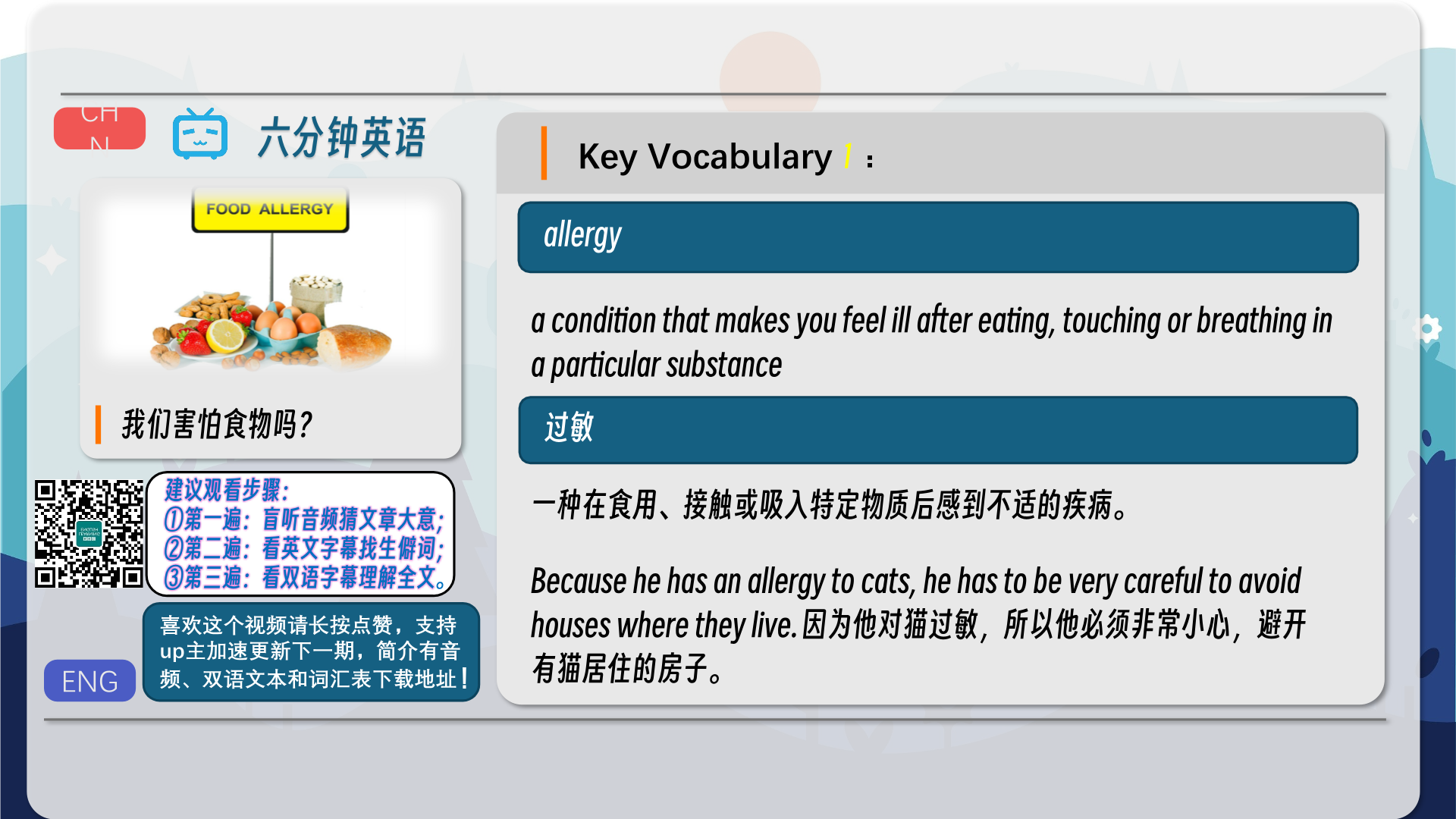
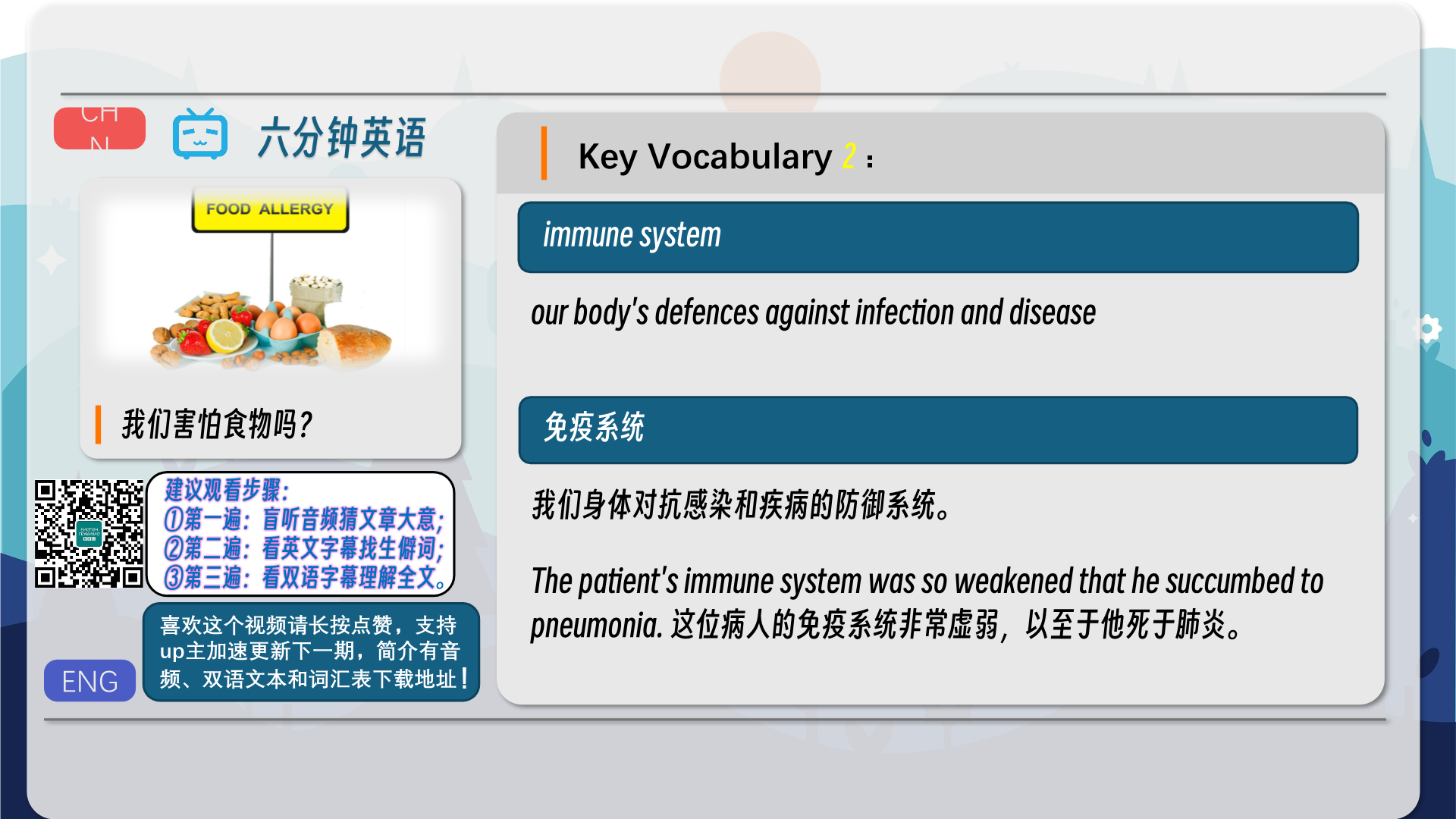
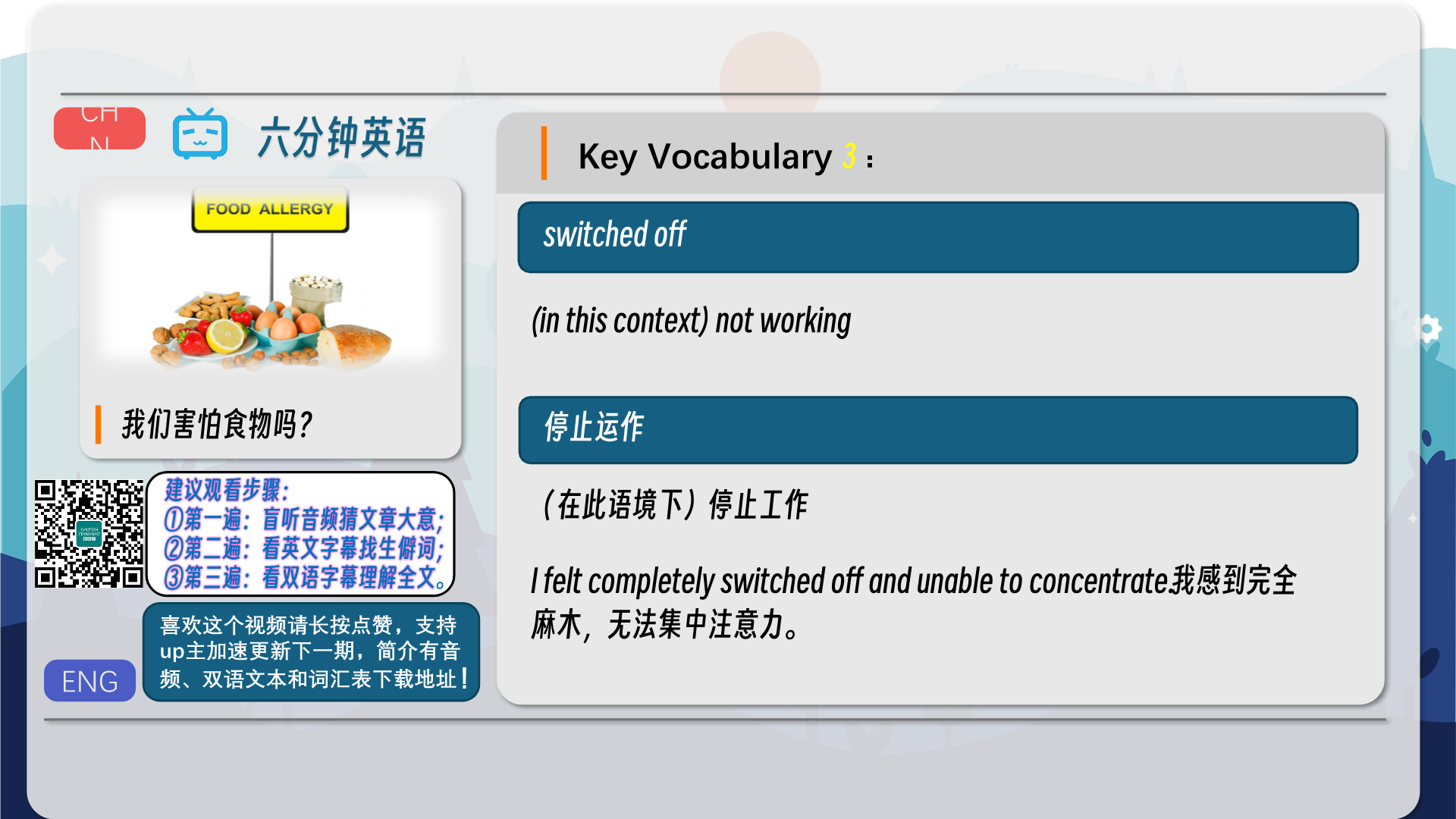
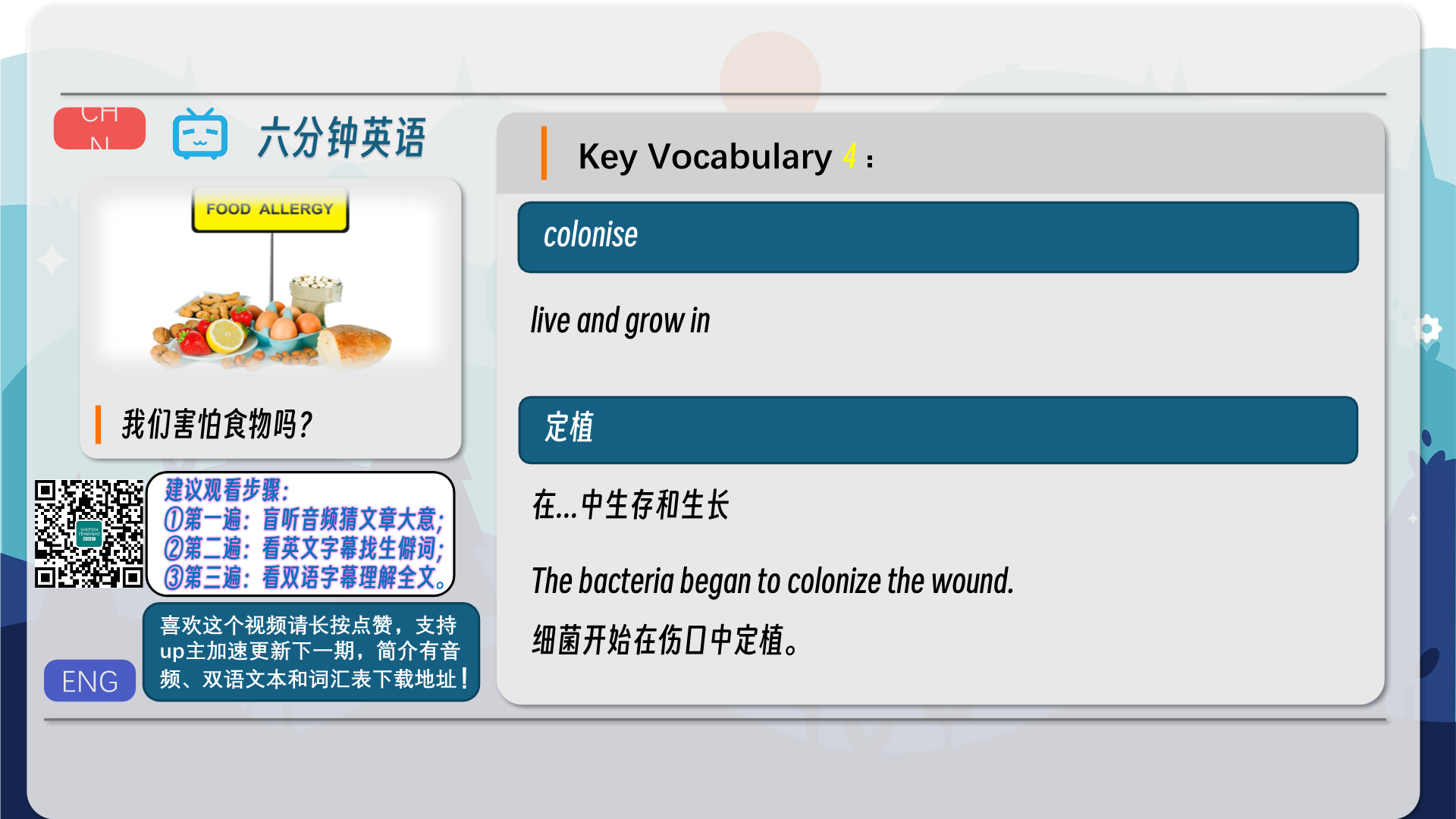
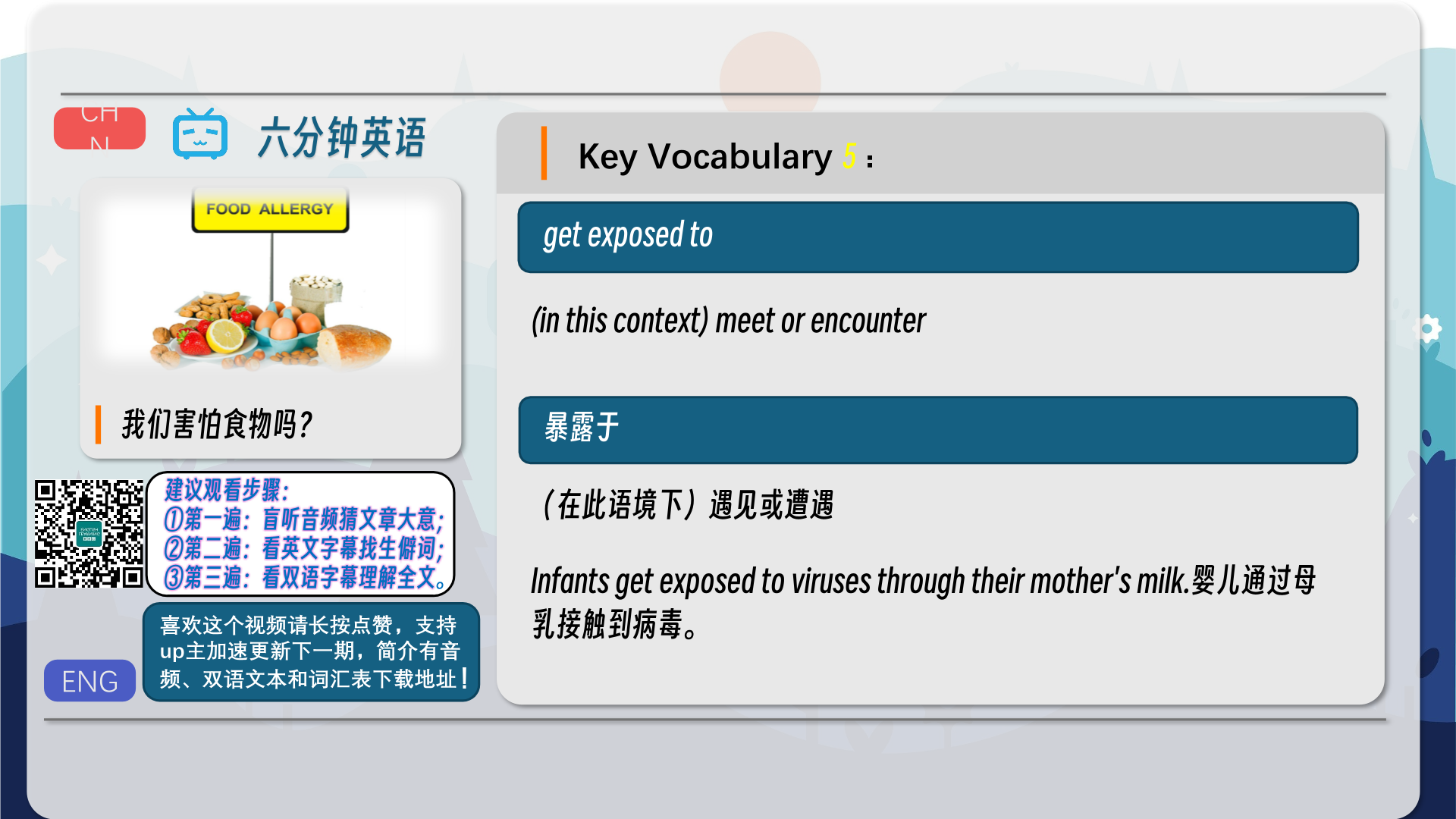
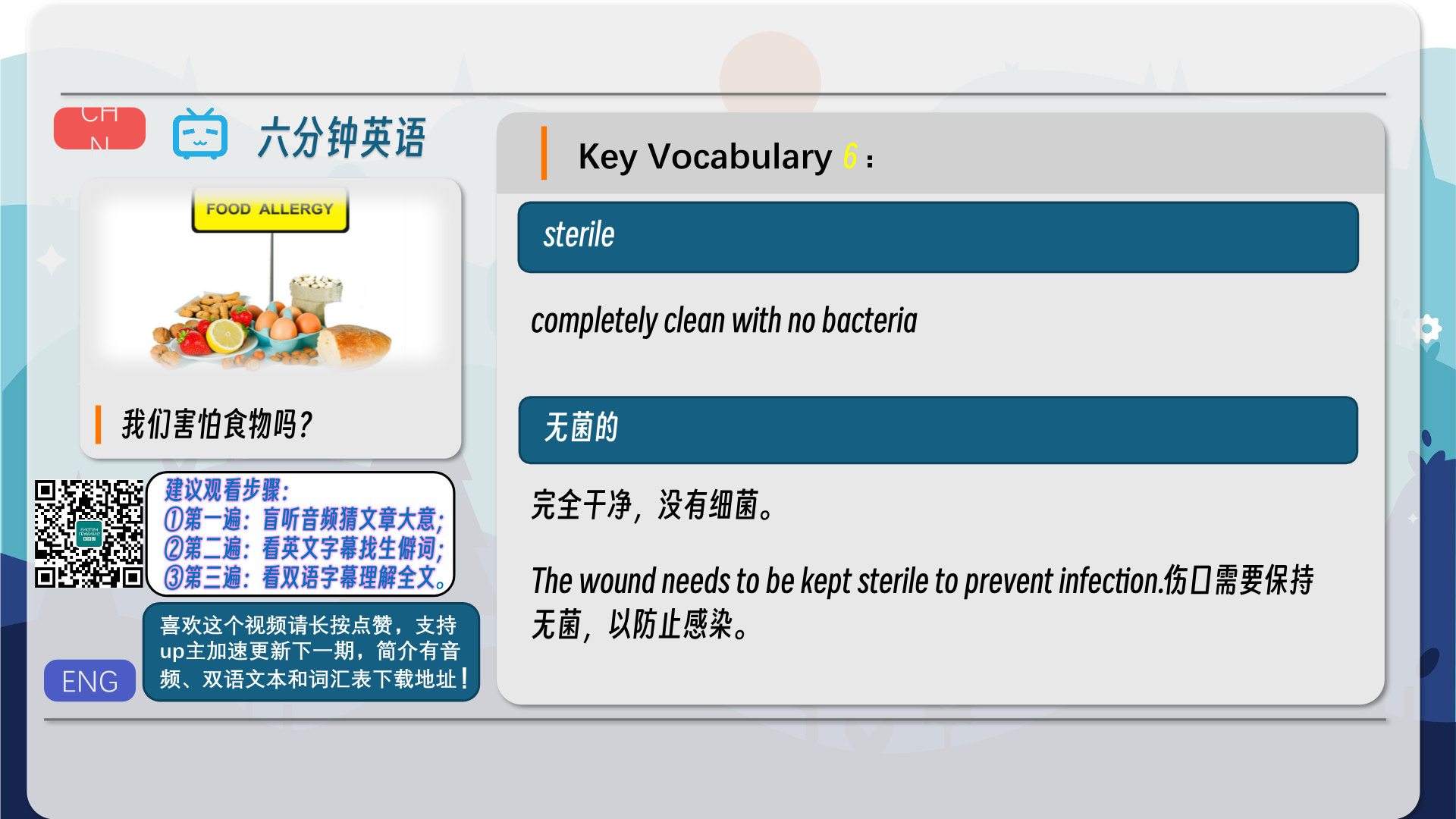
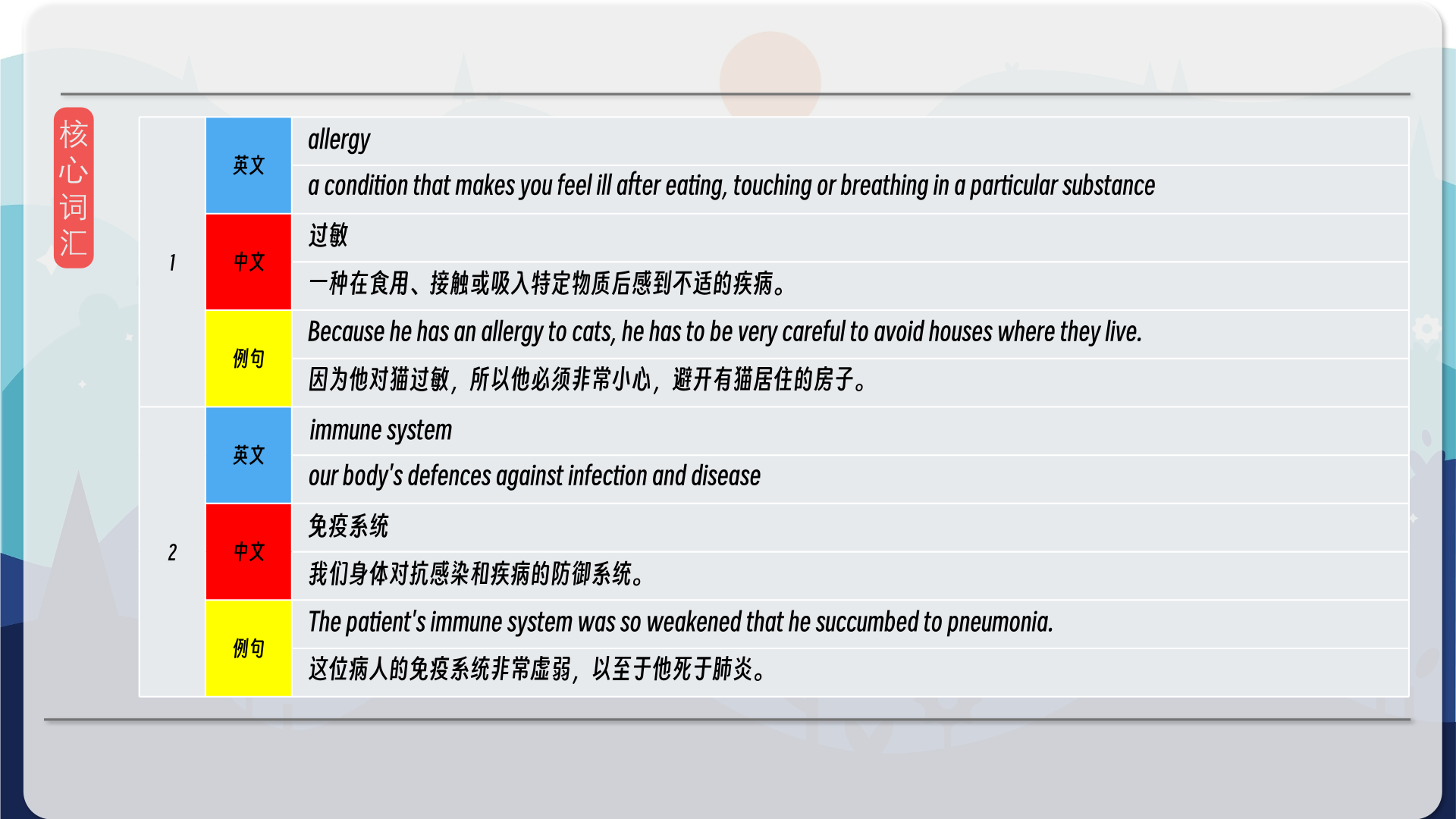
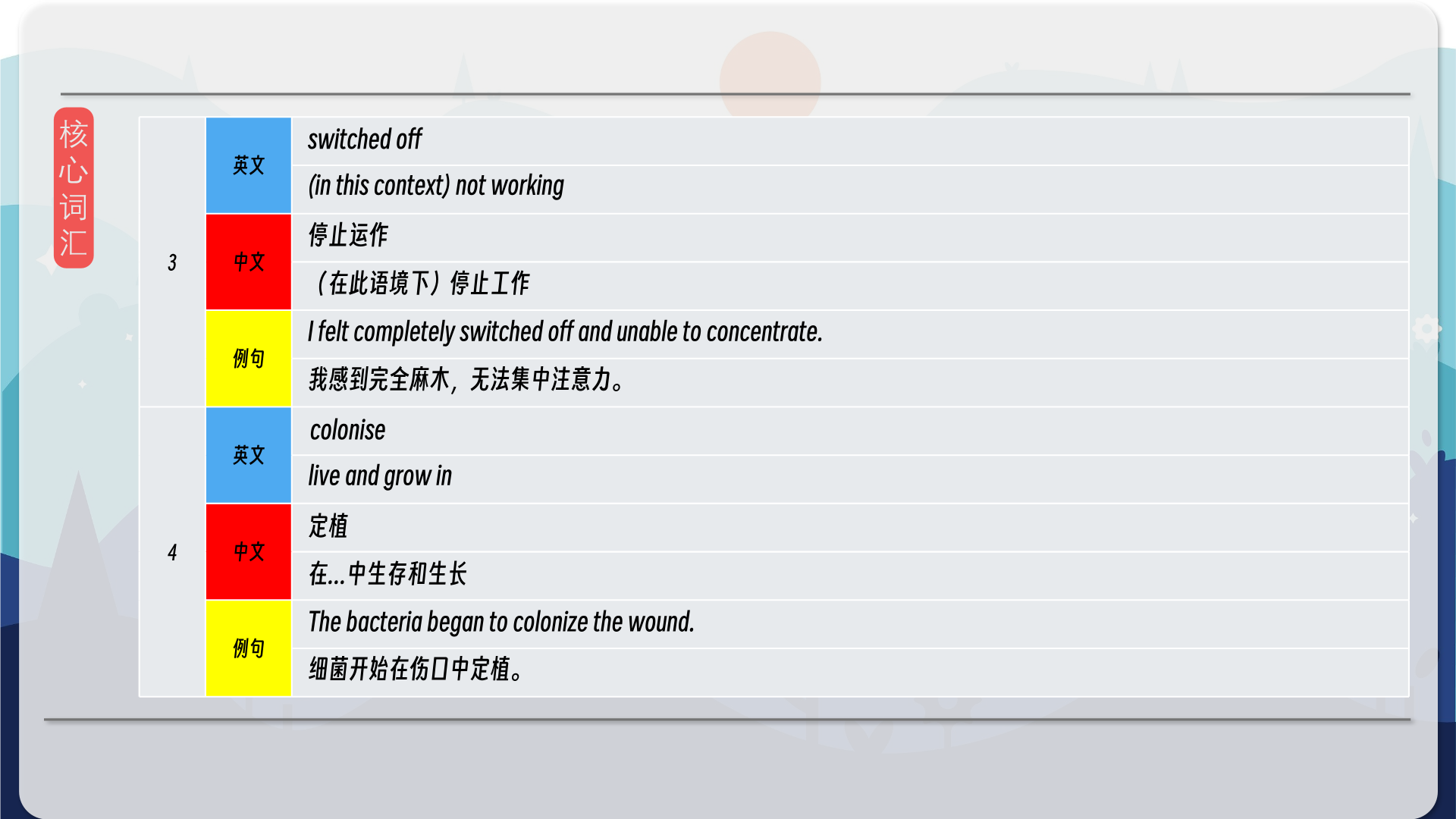
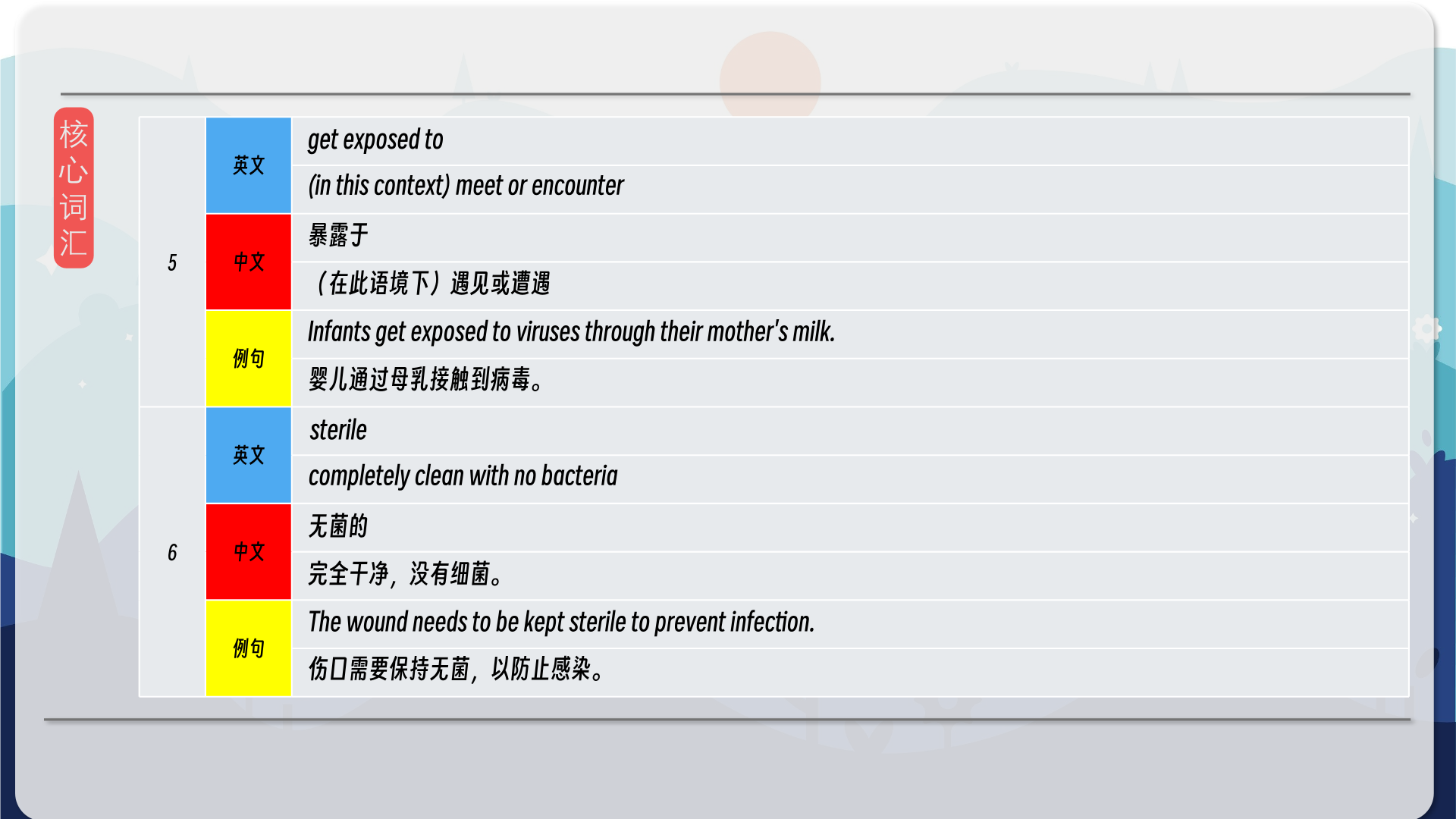
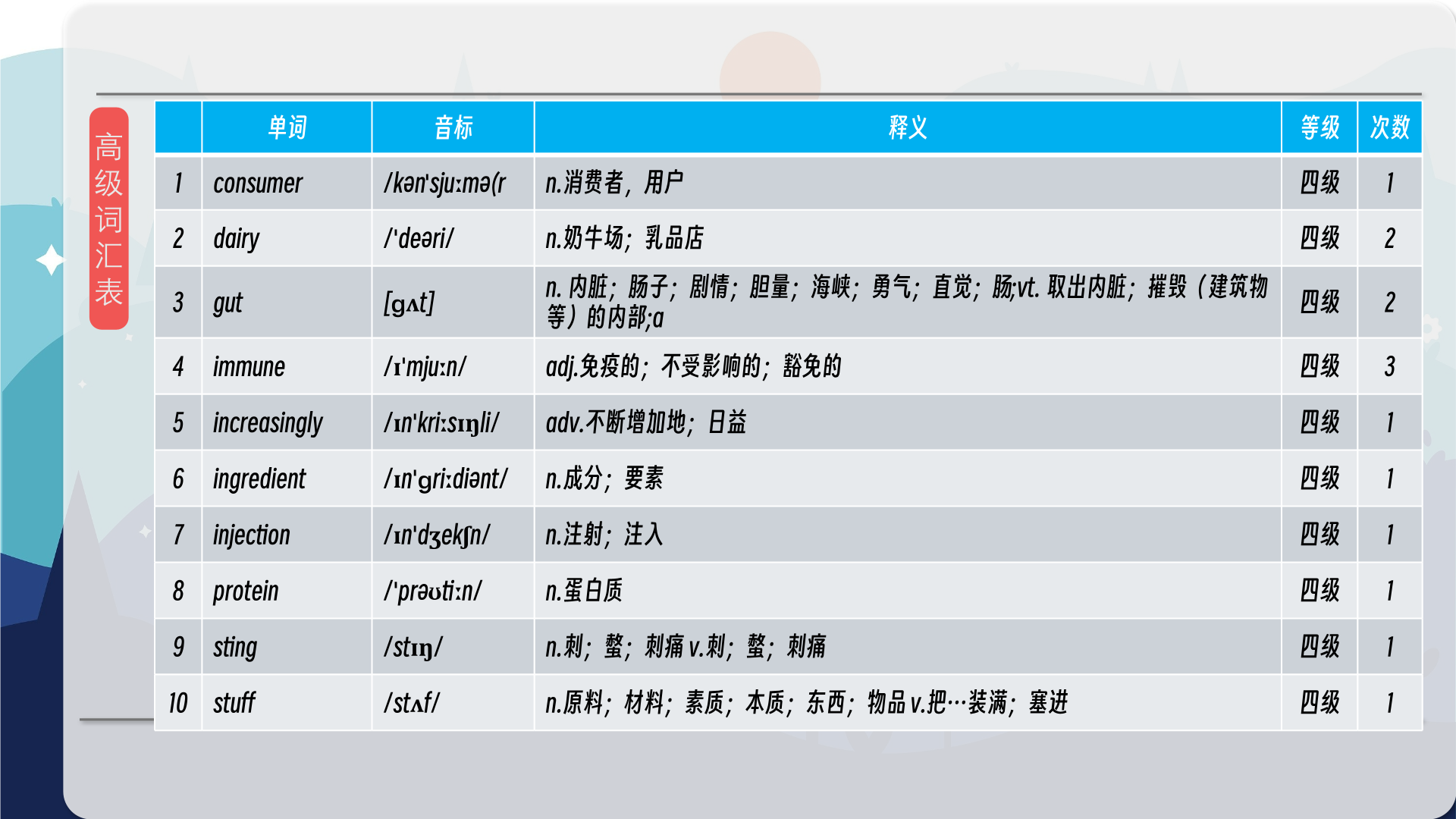
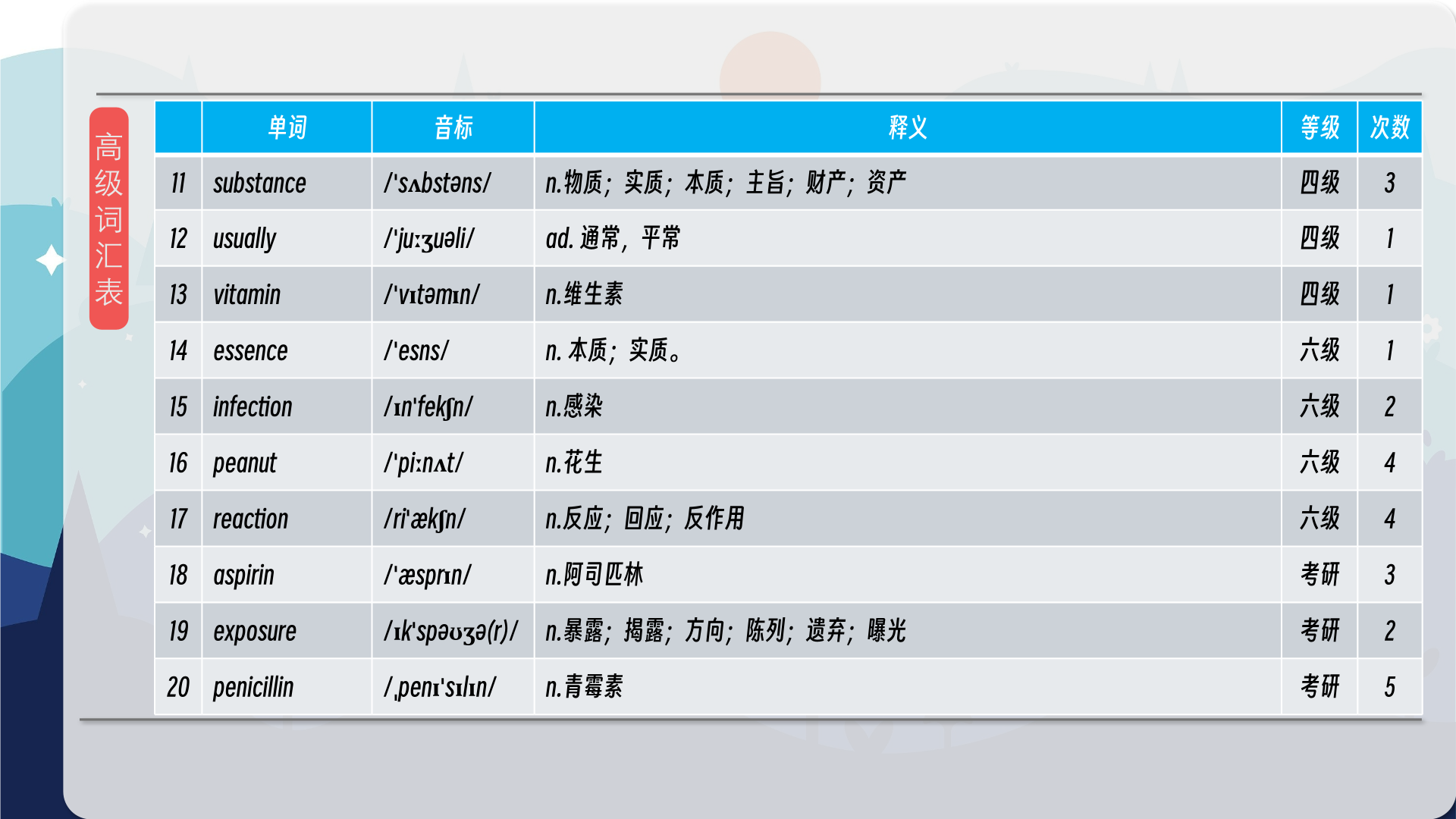
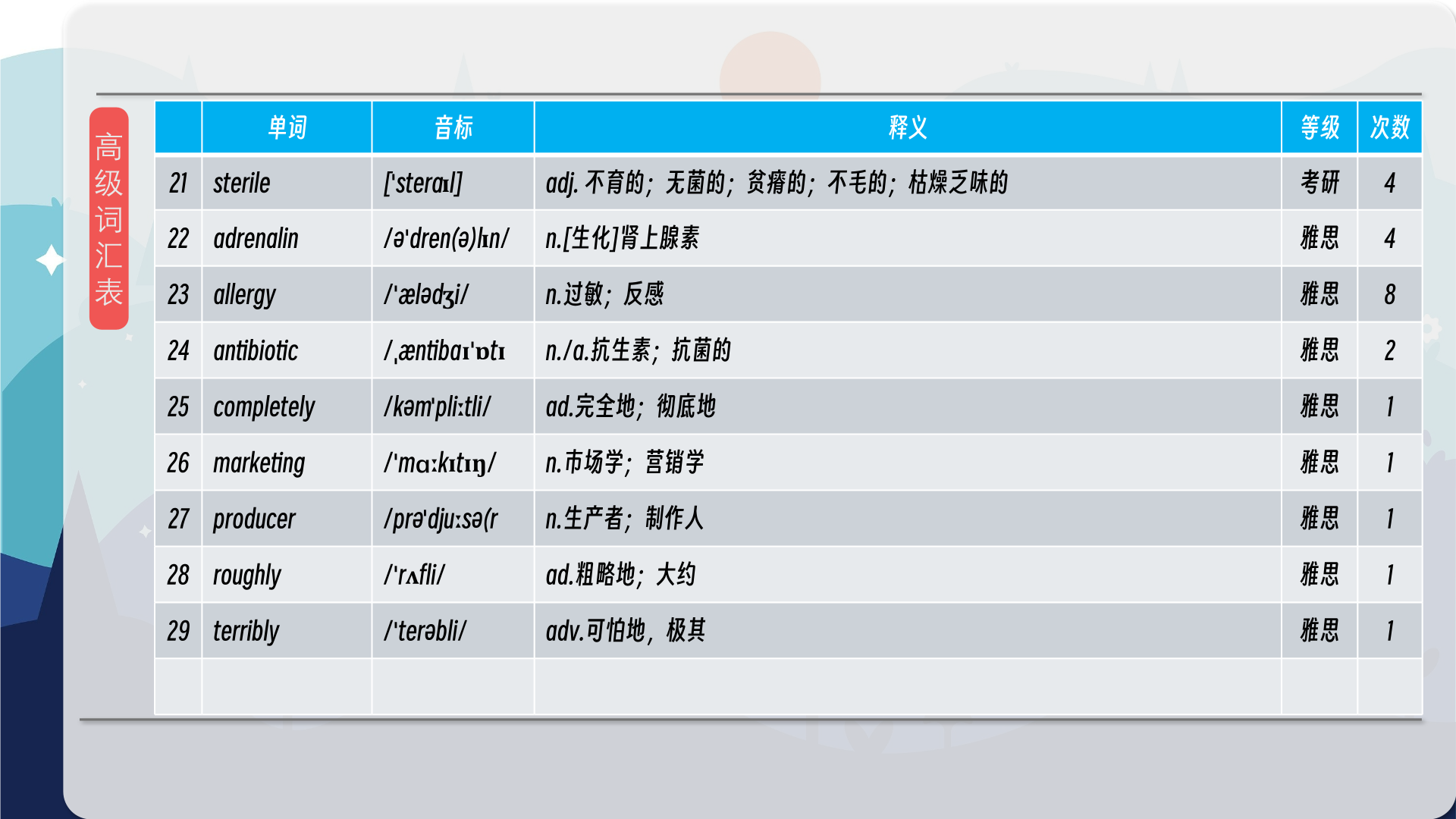
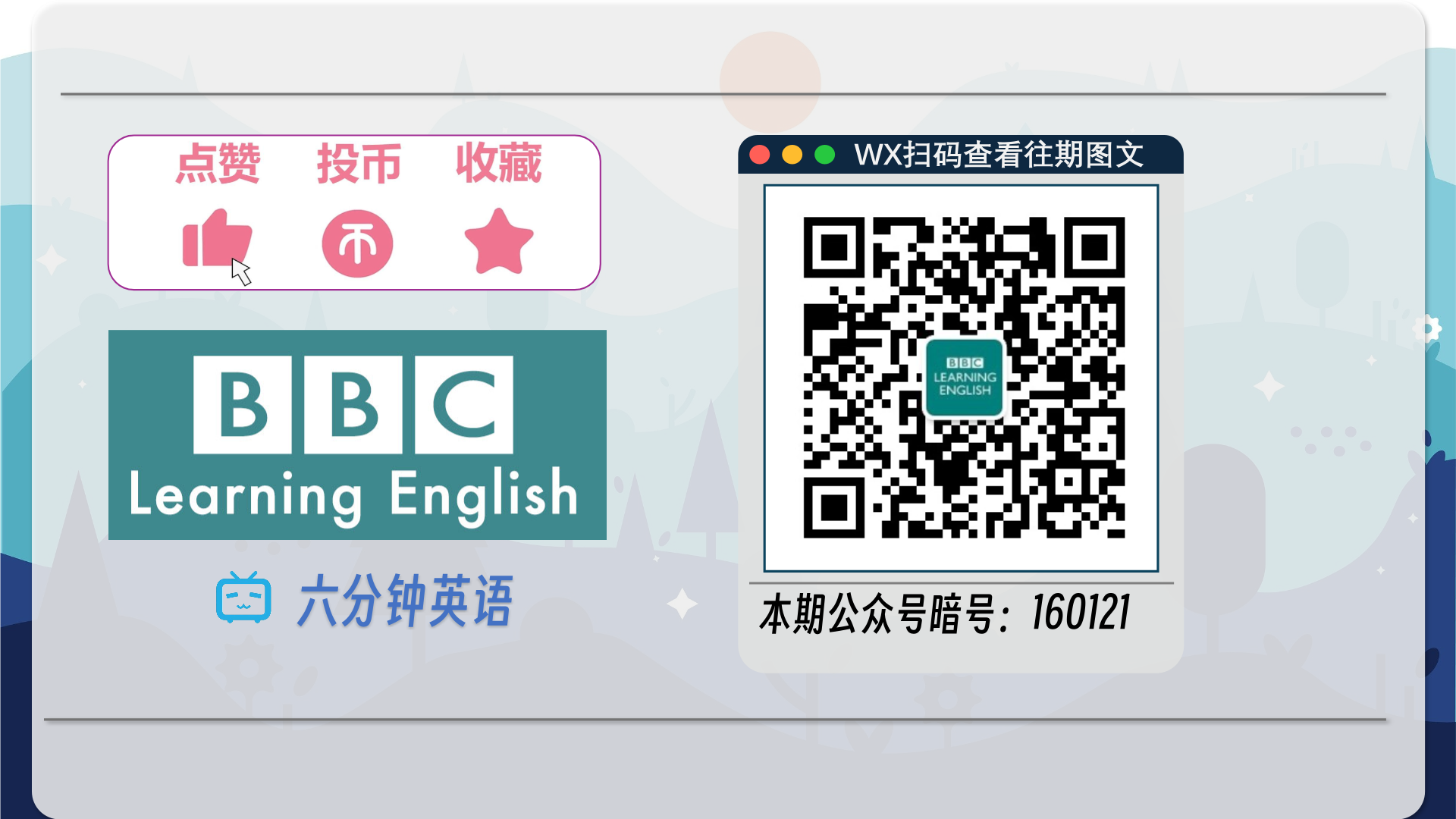
【核心词汇】
allergy
a condition that makes you feel ill after eating, touching or breathing in a particular substance
过敏
一种在食用、接触或吸入特定物质后感到不适的疾病。
Because he has an allergy to cats, he has to be very careful to avoid houses where they live.
因为他对猫过敏,所以他必须非常小心,避开有猫居住的房子。
immune system
our body’s defences against infection and disease
免疫系统
我们身体对抗感染和疾病的防御系统。
The patient’s immune system was so weakened that he succumbed to pneumonia.
这位病人的免疫系统非常虚弱,以至于他死于肺炎。
switched off
(in this context) not working
停止运作
(在此语境下)停止工作
I felt completely switched off and unable to concentrate.
我感到完全麻木,无法集中注意力。
colonise
live and grow in
定植
在…中生存和生长
The bacteria began to colonize the wound.
细菌开始在伤口中定植。
get exposed to
(in this context) meet or encounter
暴露于
(在此语境下)遇见或遭遇
Infants get exposed to viruses through their mother’s milk.
婴儿通过母乳接触到病毒。
sterile
completely clean with no bacteria
无菌的
完全干净,没有细菌。
The wound needs to be kept sterile to prevent infection.
伤口需要保持无菌,以防止感染。
在公众号里输入6位数字,获取【对话音频、英文文本、中文翻译、核心词汇和高级词汇表】电子档,6位数字【暗号】在文章的最后一张图片,如【220728】,表示22年7月28日这一期。公众号没有的文章说明还没有制作相关资料。年度合集在B站【六分钟英语】工房获取,每年共计300+文档,感谢支持!